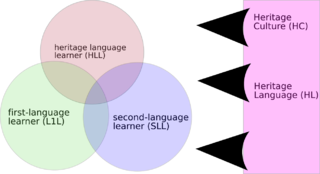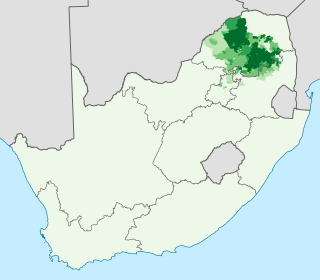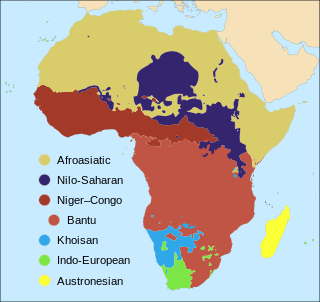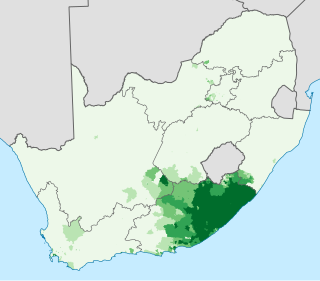There are eleven official names of South Africa , [1] one in each of its eleven official languages. The number is surpassed only by India. These languages include English, Afrikaans, the Nguni languages (Zulu, Xhosa, Ndebele, and Swazi), as well as the Sotho languages, which include Tswana, Sotho and Northern Sotho. The remaining two languages are Venda and Tsonga.

South Africa, officially the Republic of South Africa (RSA), is the southernmost country in Africa. It is bounded to the south by 2,798 kilometres (1,739 mi) of coastline of Southern Africa stretching along the South Atlantic and Indian Oceans; to the north by the neighbouring countries of Namibia, Botswana, and Zimbabwe; and to the east and northeast by Mozambique and Eswatini (Swaziland); and it surrounds the enclaved country of Lesotho. South Africa is the largest country in Southern Africa and the 25th-largest country in the world by land area and, with over 57 million people, is the world's 24th-most populous nation. It is the southernmost country on the mainland of the Old World or the Eastern Hemisphere. About 80 percent of South Africans are of Bantu ancestry, divided among a variety of ethnic groups speaking different African languages, nine of which have official status. The remaining population consists of Africa's largest communities of European, Asian (Indian), and multiracial (Coloured) ancestry.

At least thirty-five languages indigenous to South Africa are spoken in the Republic, ten of which are official languages of South Africa: Ndebele, Northern Sotho, Sotho, SiSwati, Tsonga, Tswana, Venda, Xhosa, Zulu and Afrikaans. The eleventh official language is South African English, which is the de facto primary language used in parliamentary and state discourse, though all official languages are equal in legal status, and unofficial languages are protected under the Constitution of South Africa, though few are mentioned by any name. South African Sign Language has legal recognition but is not an official language, despite a campaign and parliamentary recommendation for it to be declared one.

English is a West Germanic language that was first spoken in early medieval England and eventually became a global lingua franca. It is named after the Angles, one of the Germanic tribes that migrated to the area of Great Britain that later took their name, as England. Both names derive from Anglia, a peninsula in the Baltic Sea. The language is closely related to Frisian and Low Saxon, and its vocabulary has been significantly influenced by other Germanic languages, particularly Norse, and to a greater extent by Latin and French.
There are smaller but still significant groups of speakers of Khoi-San languages which are not official languages, but are one of the eight unofficially recognised languages. There are even smaller groups of speakers of endangered languages, many of which are from the Khoi-San family, but receive no official status; however, some groups within South Africa are attempting to promote their use and revival.

An endangered language, or moribund language, is a language that is at risk of falling out of use as its speakers die out or shift to speaking another language. Language loss occurs when the language has no more native speakers and becomes a "dead language". If no one can speak the language at all, it becomes an "extinct language". A dead language may still be studied through recordings or writings, but it is still dead or extinct unless there are fluent speakers. Although languages have always become extinct throughout human history, they are currently dying at an accelerated rate because of globalization, neocolonialism and linguicide.
The official names are: [2]
| Language | Long form | Short form |
|---|---|---|
| Afrikaans | Republiek van Suid-Afrika | Suid-Afrika |
| English | Republic of South Africa | South Africa |
| Northern Sotho | Repabliki ya Afrika-Borwa | Afrika Borwa |
| Southern Ndebele | iRiphabliki yeSewula Afrika | iSewula Afrika |
| Southern Sotho | Rephaboliki ya Afrika Borwa | Afrika Borwa |
| Swazi | iRiphabhulikhi yeNingizimu Afrika | iNingizimu Afrika |
| Tsonga | Riphabliki ra Afrika Dzonga | Afrika-Dzonga |
| Tswana | Rephaboliki ya Aforika Borwa | Aforika Borwa |
| Venda | Riphabuḽiki ya Afurika Tshipembe | Afurika Tshipembe |
| Xhosa | iRiphabliki yomZantsi Afrika | uMzantsi Afrika |
| Zulu | iRiphabhuliki yaseNingizimu Afrika | iNingizimu Afrika |
And one former name:
| Language | Long form | Short form | Period |
|---|---|---|---|
| Dutch | Republiek van Zuid-Afrika | Zuid-Afrika | 1961–1983 |
South Africa's country code, ZA, is an abbreviation of this former official name, Zuid-Afrika.

Country codes are short alphabetic or numeric geographical codes (geocodes) developed to represent countries and dependent areas, for use in data processing and communications. Several different systems have been developed to do this. The term country code frequently refers to international dialing codes, the E.164 country calling codes.










